| Amarotypini | |
|---|---|
 | |
| Amarotypus edwardsii, New Zealand | |
| Scientific classification | |
| Kingdom: | Animalia |
| Phylum: | Arthropoda |
| Class: | Insecta |
| Order: | Coleoptera |
| Family: | Carabidae |
| Subfamily: | Migadopinae |
| Tribe: | Amarotypini Erwin, 1985 |
| Genera | |
Amarotypus | |
| Amarotypini | |
|---|---|
 | |
| Amarotypus edwardsii, New Zealand | |
| Scientific classification | |
| Kingdom: | Animalia |
| Phylum: | Arthropoda |
| Class: | Insecta |
| Order: | Coleoptera |
| Family: | Carabidae |
| Subfamily: | Migadopinae |
| Tribe: | Amarotypini Erwin, 1985 |
| Genera | |
Amarotypus | |
Amarotypines are a small tribe of ground beetles (Carabidae), recognised as a distinct tribe since 1985. [1] The best known species is Amarotypus edwardsii of New Zealand, widely distributed throughout the three main islands, and arboreal in habits. [2]
Previously considered to be migadopines (before 1985), amarotypines are still often treated as forming a monophyletic subfamily Migadopinae with Migadopini, [5] but the phylogeny may be (Amarotypini, (Migadopini, Elaphrini)). [6] Alternatively, Amarotypini may form a clade with Promecognathini, again unrelated to Migadopini, [7] though this possible relationship has been disputed. [8]

The Trachypachidae are a family of beetles that generally resemble small ground beetles, but that are distinguished by the large coxae of their rearmost legs. There are only six known extant species in the family, with four species of Trachypachus found in northern Eurasia and northern North America, and two species of Systolosoma in Chile and Argentina. They were much more diverse in the past, with dozens of described species from the Mesozoic.
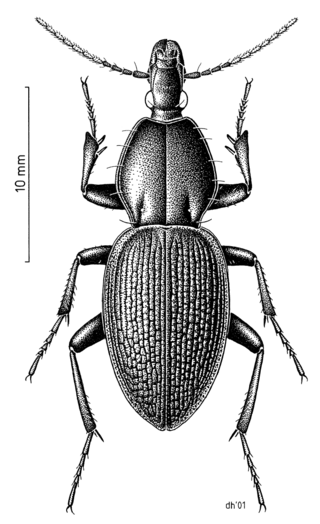
Maoripamborus fairburni is a species of beetle in the family Carabidae, the only described species in the genus. The genus is endemic to the northern North Island of New Zealand, and is most closely related to the Australian genus Pamborus.
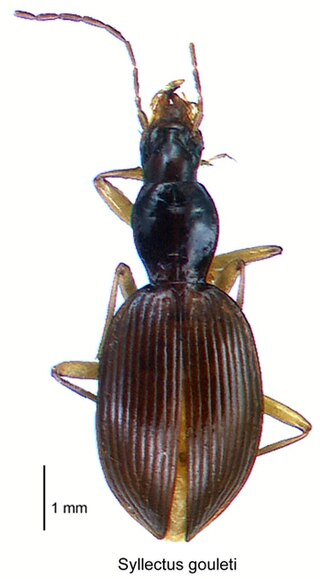
Syllectus is a genus of beetles in the family Carabidae, endemic to New Zealand.
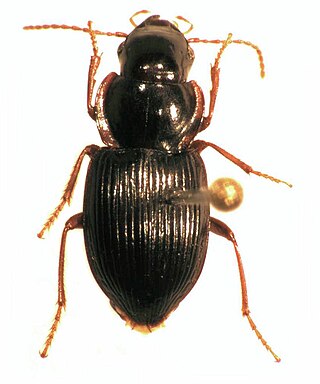
Tuiharpalus is a genus of beetle in the family Carabidae, endemic to New Zealand, where it occurs only in Northland and on the Three Kings Islands.
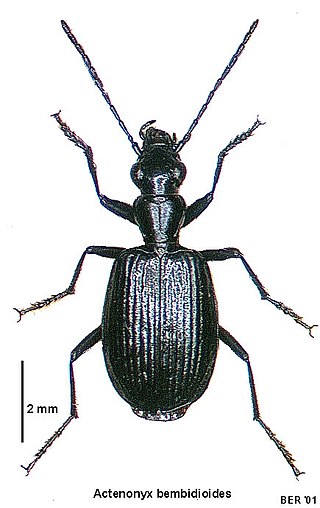
Actenonyx is a genus of beetles in the family Carabidae. At present only species in this genus is Actenonyx bembidioides. However it has been suggested that a taxonomic revision of this genus is needed as there are two species that await description. This genus and species was first described by Adam White and is endemic to New Zealand.
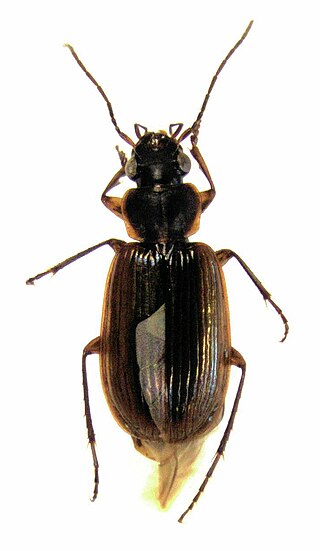
Physolaesthus is a genus of beetles in the family Carabidae, containing the following species:

Platyninae is a subfamily of ground beetles.
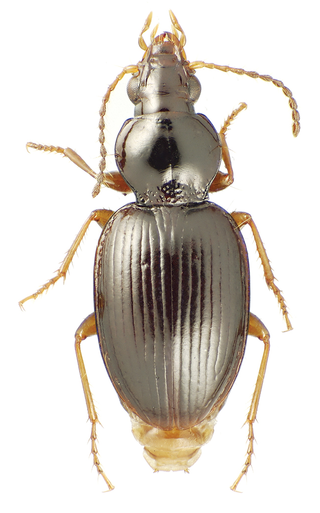
Mecyclothorax is a genus of beetles that contains over 400 described species or subspecies, mostly from the Hawaiian Islands, and Tahiti and Moorea, French Polynesia. Additional radiations have evolved in Queensland, Australia, New Guinea and New Caledonia. The genus has been divided into five subgenera: Eucyclothorax Liebherr 2018 of Australia, Qecyclothorax Liebherr 2018 of Queensland, Australia, Meonochilus Liebherr & Marris, 2009 of New Zealand, Phacothorax Jeannel 1944 of New Caledonia, and the more widely distributed subgenus Mecyclothorax Sharp 1903 [in Australia, the Sundas, New Zealand, the Society Islands, and Hawaii]. The adelphotaxon to Mecyclothorax is hypothesized to consist of the genera associated with Amblytelus Blackburn, also distributed in Australia, and therefore the evolutionary history of Mecyclothorax commenced in Australia.

Psydrinae is a subfamily of beetles in the family Carabidae.
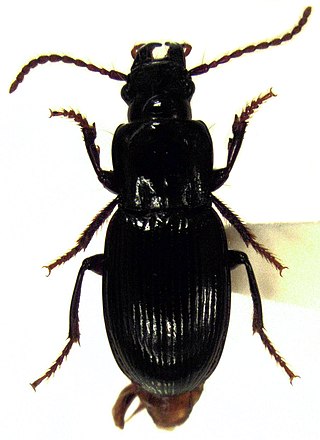
Selenochilus is a genus of beetles in the family Carabidae, endemic to New Zealand, including the following seven species:

Molopsida is a genus of beetles in the family Carabidae, endemic to New Zealand. This genus was first described by Adam White (zoologist) in 1846. Molopsida includes the following six species:

Plocamostethus is a genus of beetles in the family Carabidae. It is endemic to New Zealand. The genus contains the following species:

Tasmanitachoides is a genus of ground beetles in the family Carabidae, endemic to Australia. The beetles are very small, typically 1.5 to 3.0 mm. in length, and live in coarse sand or fine gravel along freshwater shorelines throughout Australia.

Zolus is a genus of beetles in the family Carabidae. The genus is endemic to New Zealand.
Martin Baehr was a German entomologist who mostly worked on ground beetles (Carabidae), but also spiders, grasshoppers and other taxa. He described and named more than 2.000 species, mostly from Southeast Asia and Australia. He studied biology at the university of Tübingen. Initially, his doctoral thesis was supervised by Willi Hennig, who, however died before Baehr´s graduation. Baehr was curator at the Zoologische Staatssammlung München, at first in charge of Heteroptera and Orthoptera, later of Coleoptera. For many years he worked as the managing editor of the zoological journal Spixiana. One of his most comprehensive taxonomic revisions treated the subfamily Pseudomorphinae. In addition to scholarly works, Baehr has written a number of popular books including Welcher Käfer ist das? published by Stuttgart-based publishing company Kosmos.

Ross Taylor Bell was an American entomologist with particular interest in the invertebrate natural history of Vermont, United States, and carabid beetles. Together with his wife, Joyce Bell, his work at the University of Vermont was largely taxonomic, where they described more than 75% of the rhysodine species known to science. Ross also wrote a number of seminal papers in his chosen field.

Bembidiini is a tribe of ground beetles in the family Carabidae. There are more than 120 genera and 3,100 described species in Bembidiini.

Mecodema crenicolle is an endemic species of ground beetle from New Zealand.

Zolini is a tribe of ground beetles in the family Carabidae. There are 11 genera and more than 60 described species in Zolini. All but one of the genera are found in Australia and New Zealand. The genus Merizodus occurs in South America.